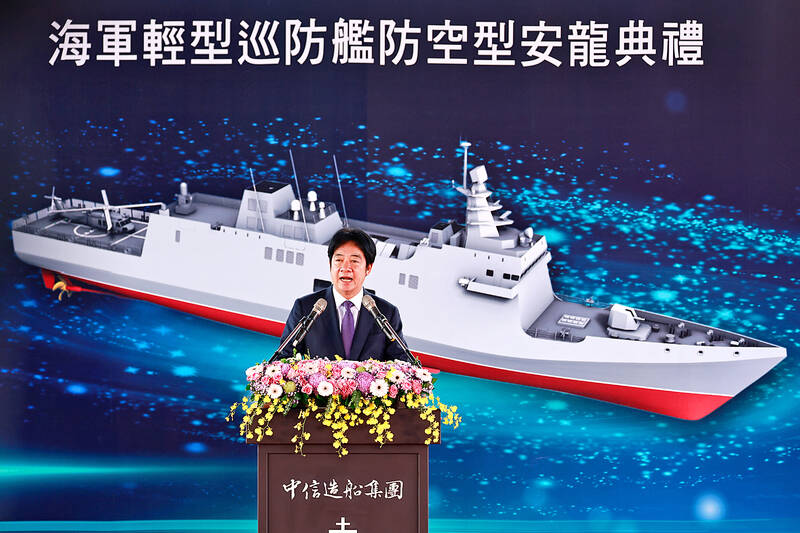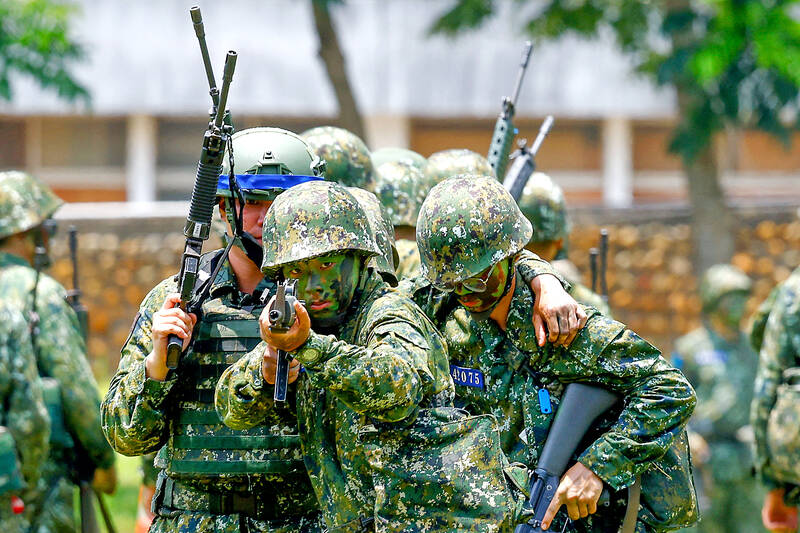Last month historian Stephen Wertheim of the Carnegie Endowment for International Peace published an opinion piece in the New York Times with suggestions for an “America First” foreign policy for Democratic presidential candidate Kamala Harris. Of course China and Taiwan received a mention.
“Under presidents Trump and Biden,” Wertheim contends, “the world’s top two powers have descended into open rivalry, with tensions over Taiwan coming to the fore.”
After complaining that Washington is militarizing the Taiwan issue, he argues that “In truth, Beijing has long proved willing to tolerate the island’s self-rule so long as Taiwan does not declare independence and the United States acknowledges the position that Taiwan is part of China.”

Photo: EPA-EFE
The People’s Republic of China (PRC) “tolerates” Taiwan’s independence because it is protected by the armed forces of two major naval powers, Japan and the US, and for no other reason. If the US withdrew from the Taiwan issue, the PRC would invade immediately.
IGNORANCE?
Reading Wertheim’s comment that the US “acknowledges” Taiwan is part of China, one might simply assume he is ignorant. After all, many commentators do not appear to be aware that under the US ‘one China’ policy, Taiwan’s status remains unresolved. However, further down, Wertheim argues that Harris “should also incentivize Taiwan to improve its own defenses, by offering stepped-up but conditional aid…”

Photo: Reuters
Put these together — aid on the condition that Taiwan do more for its own defense, and the claim that the US “acknowledges” Taiwan is part of China. Now add his next recommendation that Harris: “should coax Japan and the Philippines to turn themselves into bulwarks hardened against Chinese invasion, regardless of what happens in Taiwan.”
That is the only mention of Japan and the Philippines in a document presumably consisting of foreign policy recommendations for Harris, and it occurs when Taiwan has become part of China. Never mind the geostrategic ignorance that contends that the Philippines, whose defense spending is minuscule and which lacks modern fighters, can become a defensive “bulwark” with PRC forces occupying Taiwan.
What kind of document are we looking at? A document that hints that Taiwan will be part of the PRC. A document that calls for conditions on defense provisions to Taiwan (note how that conflicts with the language and intent of the Taiwan Relations Act). A document that does not mention Japan and the Philippines in the context of defending Taiwan. A document that does not forthrightly state the US ‘one China’ policy. A document that mentions “tensions” over Taiwan without mentioning their cause.
Welcome to version 2.0 of the Taiwan sellout argument. We are witnessing its real-time evolution.
A decade ago sellout types like Charles Glaser and Hugh White at least had the intellectual honesty to clearly say what they wanted. Their arguments were easy to recognize: they ignored the consequences of losing Taiwan for Japan and the Philippines and the subsequent follow-on wars, they contended that Taiwan provoked the PRC and caused tension and was part of the PRC, and so on.
ABANDON TAIWAN
In the last few months, however, the emergent argument has now become a moral one, made by many Americans on the Trump side: Taiwan should do more for its own defense (who can disagree?). The implication of this, sometimes made plain, is that if Taiwan’s spending levels don’t satisfy some arbitrary, ever-changing figure set in Washington, then it should be abandoned. Taken as a whole, Wertheim is forwarding that argument, in the form of recommendations, as well.
The arguments of the old school “abandon Taiwan” crowd had no moral angle on their demand. Indeed, they were well aware of the essential amorality of their position, and so presented it as the hard choice, one that real men make, camouflaging their feeble, uninformed arguments in clouds of testosterone-drunk prose peppered with phrases like “harsh reality.”
The new arguments for abandoning Taiwan hinge on contending that Taiwan can be left to its fate if it does not spend more. This condition makes it morally acceptable to abandon Taiwan when its defense spending does not reach “enough.” Proponents can now adopt a morally sanctified “real man” position: “well, they chose their fate.” And Taiwan takes the blame!
This position then updates the old bubbleverse position in which Tokyo and Manila were not mentioned. The new view recognizes that the loss of Taiwan inevitably threatens Japan and Philippines. The response to that is magical thinking: Japan and the Philippines should now be expected to field a defense against the PRC on their own, a position that Elbridge Colby and Stephen Wertheim, among others, appear to advocate.
The madness of this position is obvious. Having abandoned Taiwan with all its geostrategic advantages, why would Manila and Tokyo imagine that the US would help defend them? Why would planners in those capitals not conclude that the Mutual Defense Treaties the US has signed would also be scrapped once Washington got around to complaining that Japan and the Philippines don’t spend enough on defense? And how could either nation — especially the Philippines — begin to field a large navy and air force in the time frame it would take for the PRC to begin operations to seize islands from either power?
‘ONE CHINA’ POLICY
Wertheim signals the pro-PRC nature of his position in other ways.
“America’s ‘one China’ policy is the most essential means of preventing conflict that Washington possesses,” he writes.
As I have noted countless times, this is nonsense: the US ‘one China’ policy is a diplomatic pretense that politely hid the US naval dominance in Asia, the real factor keeping the peace. As long as the US could crush the PRC in a war, it could have any policy it wanted. Indeed, it did: it followed a policy that Taiwan is not part of the PRC.
Emphasizing the role of the US ‘one China’ policy, without naming Taiwan’s status under that policy, is a rhetorical move commonly made by pro-PRC writers, who seek to stem the tide of US rearmament by assigning the success of US policy at keeping the peace to diplomacy, not war making capacity. We last saw that rhetoric back in September in the International Crisis Group’s recommendations.
Like others advocating the “conditional” approach, Wertheim does not require the US to take action to spur Taipei to spend by concretely signaling its reliability (his recommendations seem blissfully unaware of the intense debate over strategic ambiguity). US unreliability is a major bonus to anti-US voices in Taiwan, and a major impediment to getting Taiwan to spend more. Taiwan is less likely to spend more while the US remains uncommitted to defending Taiwan. Hence, neglecting the US side of the equation is tantamount to arguing that Taiwan should be abandoned.
Sellout 2.0: Coming soon to a Taiwan commentary near you!
Notes from Central Taiwan is a column written by long-term resident Michael Turton, who provides incisive commentary informed by three decades of living in and writing about his adoptive country. The views expressed here are his own.

Every now and then, it’s nice to just point somewhere on a map and head out with no plan. In Taiwan, where convenience reigns, food options are plentiful and people are generally friendly and helpful, this type of trip is that much easier to pull off. One day last November, a spur-of-the-moment day hike in the hills of Chiayi County turned into a surprisingly memorable experience that impressed on me once again how fortunate we all are to call this island home. The scenery I walked through that day — a mix of forest and farms reaching up into the clouds

With one week left until election day, the drama is high in the race for the Chinese Nationalist Party (KMT) chair. The race is still potentially wide open between the three frontrunners. The most accurate poll is done by Apollo Survey & Research Co (艾普羅民調公司), which was conducted a week and a half ago with two-thirds of the respondents party members, who are the only ones eligible to vote. For details on the candidates, check the Oct. 4 edition of this column, “A look at the KMT chair candidates” on page 12. The popular frontrunner was 56-year-old Cheng Li-wun (鄭麗文)

“How China Threatens to Force Taiwan Into a Total Blackout” screamed a Wall Street Journal (WSJ) headline last week, yet another of the endless clickbait examples of the energy threat via blockade that doesn’t exist. Since the headline is recycled, I will recycle the rebuttal: once industrial power demand collapses (there’s a blockade so trade is gone, remember?) “a handful of shops and factories could run for months on coal and renewables, as Ko Yun-ling (柯昀伶) and Chao Chia-wei (趙家緯) pointed out in a piece at Taiwan Insight earlier this year.” Sadly, the existence of these facts will not stop the

Oct. 13 to Oct. 19 When ordered to resign from her teaching position in June 1928 due to her husband’s anti-colonial activities, Lin Shih-hao (林氏好) refused to back down. The next day, she still showed up at Tainan Second Preschool, where she was warned that she would be fired if she didn’t comply. Lin continued to ignore the orders and was eventually let go without severance — even losing her pay for that month. Rather than despairing, she found a non-government job and even joined her husband Lu Ping-ting’s (盧丙丁) non-violent resistance and labor rights movements. When the government’s 1931 crackdown